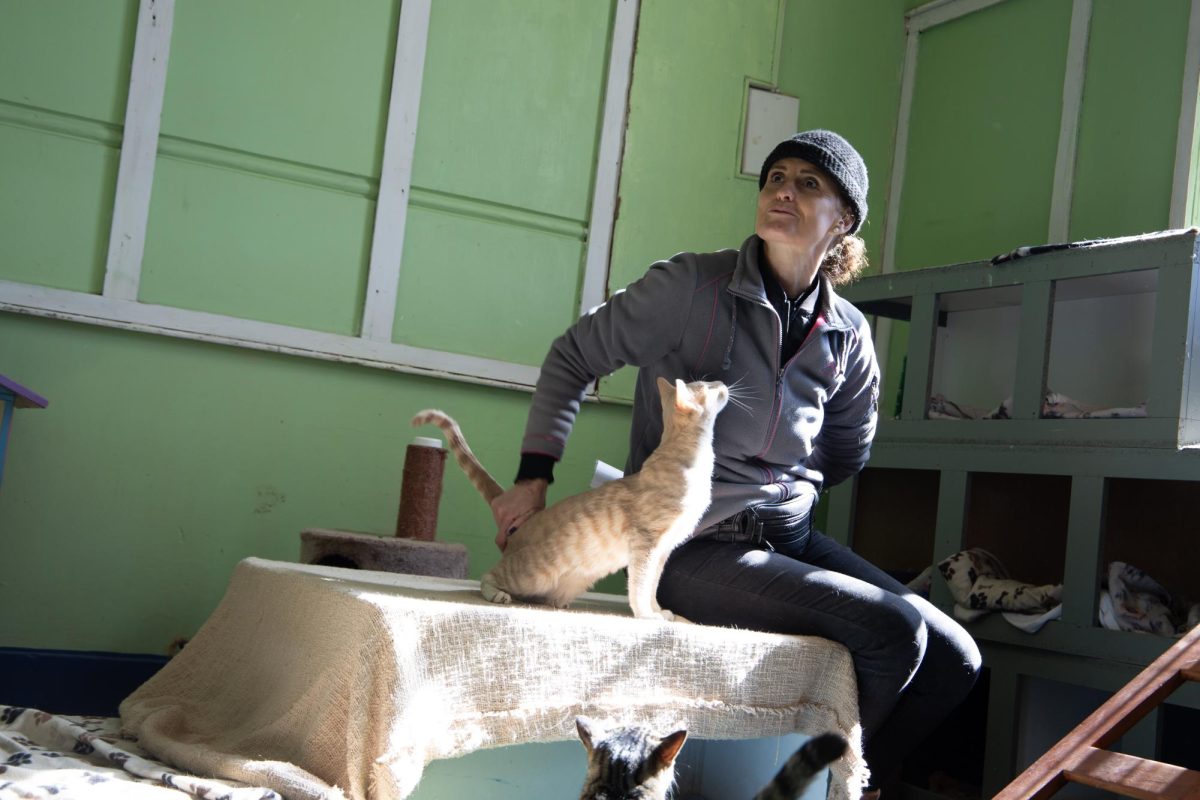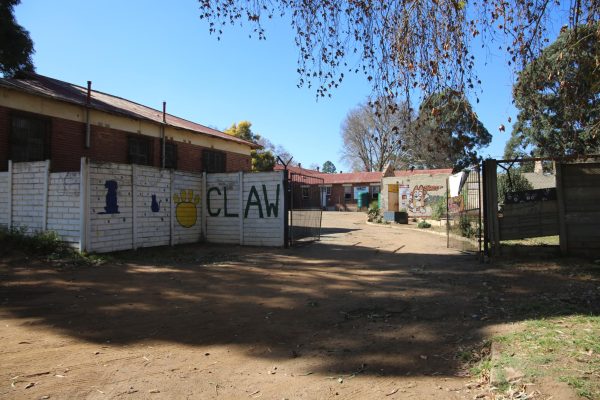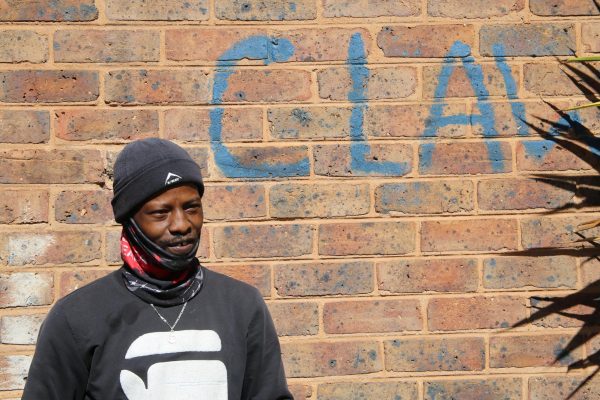
Michelle Potts-Weedman, who helps to run CLAW, plays with one of the cats in the cat room at the organization's facility. PHOTO: SAHR KARIMU/THE HAWK
ROODEPOORT, South Africa – The volunteers weren’t even looking for Mama when they found her at an illegal mining site in Durban Deep, an area 12 miles west of Johannesburg that was once home to a now-defunct gold mine. They had been tipped off about another dog that had been shot in the face and needed their help.
They found Mama, a large black Lab mix, and her puppies crying under a fence. The volunteers brought the dogs back to CLAW, an animal welfare organization located nearby in an old mining camp, recalled Michelle Potts-Weedman, one of CLAW’s two full-time volunteers who helps run the organization. Mama’s owner came forward months later demanding to take Mama and her puppies back. The puppies had already been adopted, but he was able to take Mama home. The next morning, volunteers arrived back at CLAW to see Mama standing outside the facility’s main gate.
“She was like, ‘I’m not going back there. This is my new home,’” Potts-Weedman said.

Mama is now one of several “house” animals who live among the ruins of the old mining camp. Mama likes to chase the other house dogs, Puppy, Russell and Pretty, in and out of the attached dwellings that housed miners. The developer who owns the land has given CLAW permission to use the space and removed the roofs, windows and doors of these dwellings to prevent unauthorized occupation of the buildings.
The main building on the property is a former office building, which contains an exam room, several kennels, a quarantine ward and two cat rooms — one for healthy cats and one for a mom and her feral kittens. Behind the office are five large enclosed dog runs and several washing stations.
At any one time, there are usually about 80 animals at the facility, half being cared for in the clinic and half awaiting adoption, Potts-Weedman said.
Cora Bailey, the other full-time volunteer, founded CLAW in the early 1990s just before the fall of the apartheid government. It was a time of political violence and unrest, which made her work all the more difficult. But she saw a need for animal welfare in the townships and wanted to help.
“We remained a constant presence,” Bailey said. “People gradually trusted [us]. It wasn’t easy.”
After 30 years of vaccinating and sterilizing cats and dogs, taking in injured and abandoned animals, facilitating adoptions, and educating and providing resources to the community, Bailey and Potts-Weedman have earned that trust.
Potts-Weedman, who has been with CLAW for six years, said people in the township know CLAW is there to help them and the animals, and that is evident when they are driving around in the community.
“They’re waving because there goes Cora,” Potts-Weedman said. “And then my bakkie [truck] looks very similar to hers because we’ve branded it the same. They used to go, ‘Cora, Cora, and I’d go, ‘It’s not Cora, it’s Michelle.’ And now I’m driving, and I get, ‘Michelle, Michelle.’”
Bailey and Potts-Weedman, along with a host of volunteer teams, take turns walking and playing with the animals, cleaning cages and blankets, and assisting with medical tasks, all without running water or electricity. They rely on solar panels and daily water deliveries from the city. The energy created from the panels powers a microscope, fridge and scale.
Since there is no vet on site for X-rays and surgical cases, animals have to be sent to private veterinarians.
Potts-Weedman credits everything CLAW is able to do to the network of people involved, including community members and volunteers.
“It all feeds off of each other, and it all works together,” Potts-Weedman said.

The volunteers are able to do a lot with very little. Potts-Weedman pointed to a dog in a cage with a deep laceration with an exposed ligament. Unable to surgically stitch the wound, the volunteers used open wound care to help the dog.
“It’s starting to close beautifully,” Potts-Weedman said with a smile.
The other volunteers at CLAW are passionate about their work, too. Xolani Sibanyoni, who has been a volunteer for six years, brought his own dog to the clinic when it was sick with parvovirus. Although Sibanyoni’s dog died, Bailey invited him to stick around to help.
“Auntie Cora just said to me, ‘You can come anytime, you can do whatever you like and I will teach you everything about dogs,’” Sibanyoni said.
Growing up on a farm instilled a deep passion for animals in Potts-Weedman. She originally worked in the automobile industry, but after volunteering with CLAW by baking for local kids and working with the dogs, she left her job to volunteer there full-time.
“It just sucked me in,” said Potts-Weedman as three cats occupying the facility’s cat room climbed in her lap. “This is it. This is me.”
On her way back to the front gate one chilly winter day in early June, Potts-Weedman paused to check on a cage of mixed-breed puppies rescued after their owner passed away. The puppies resided in a cage outside so they could get some vitamin D while going through their daily deworming treatment. As soon as the puppies are healthy, they will be vaccinated and adoptable. She was pleased with their progress.
Not every day is a good day, though.
“There are too many animals and not enough homes,” Potts-Weedman said.
The organization is sometimes forced to euthanize animals who are too sick, injured or otherwise unadoptable. Financial stress also takes a toll. Without government funding, CLAW relies solely on private donations.
But Potts-Weedman said the organization has an “open door policy” and won’t turn animals away. They know if someone can’t afford to take care of their animal, or simply doesn’t want it, they will likely abandon it somewhere. An estimated 22% of companion animals in South Africa are homeless, according to Four Paws, a global animal welfare organization.
Local crime — common in impoverished former mining areas where illegal mining takes place — is also a challenge. The clinic has been subject to theft. Solar panels have been stolen, as well as food and medical supplies, Potts-Weedman said.
“The stress of the place does get to you, but the good stuff lifts you up,” Potts-Weedman said. “You have to find your strength and push through because if you’re not going to be here, then who will be?”

CLAW not only focuses on animals but also the welfare of the people in the area — Potts-Weedman said the two go hand in hand. The organization holds food drives and works with kids in the community, which is how they are able to build trust, she said.
“They see that we’re not just about the animals,” Potts-Weedman said. “We’re also about the people.”
Sibanyoni said CLAW has taught him more than just animal welfare. He has learned how to connect with people.
“Since I came here, it became simple for me to be free to speak to everyone,” Sibanyoni said.
The next step for CLAW is a new facility that has running water and electricity, and is safer. But that is a dream that is “long term stuff,” Potts-Weedman said. For now, there are animals, and people, in Durban Deep who need CLAW’s help, Potts-Weedman said.
Despite the struggles, Bailey and Potts-Weedman said they are proud of the work they have done.
“We’ve always just done what we can with what we have,” Bailey said. “I don’t know that I could have done anything different.”